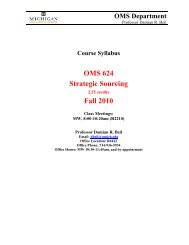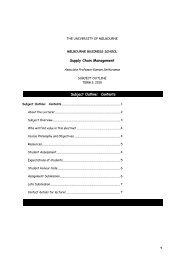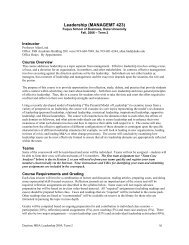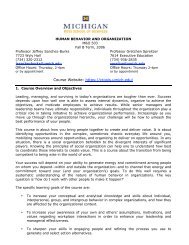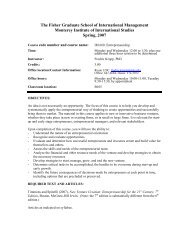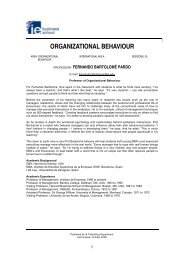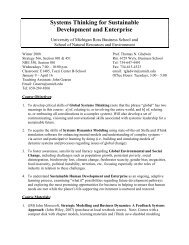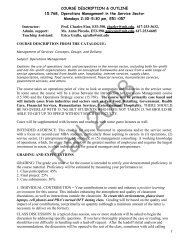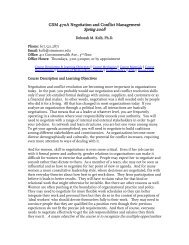behavioral decision making: biases, heuristics and errors.
behavioral decision making: biases, heuristics and errors.
behavioral decision making: biases, heuristics and errors.
You also want an ePaper? Increase the reach of your titles
YUMPU automatically turns print PDFs into web optimized ePapers that Google loves.
SESSION 6<br />
<br />
Readings<br />
[Q, 1] Finance <strong>and</strong> Economics: Carrots dressed as sticks; Designing rewards. (2010). The<br />
Economist, 394(8665), 72.<br />
[Q, 2] Goode, E. (2001, January 9). In Weird Math of Choices, 6 Choices Can Beat 600,<br />
[Q, 2]<br />
The New York Times.<br />
Johnson, E. J., & Goldstein, D. G. (2003). Medicine - Do defaults save lives Science,<br />
302(5649), 1338-1339.<br />
[R, 10] Chapter 4 Framing <strong>and</strong> Reversal in Bazerman, M. H., & Moore, D. (2009). Judgment<br />
in managerial <strong>decision</strong> <strong>making</strong> (7th ed.). Hoboken, NJ: J. Wiley & Sons.<br />
[R, 16] Chapter 2 in Belsky, G., & Gilovich, T.<br />
(2010). Why smart people make big money mistakes...<strong>and</strong> how to correct them:<br />
Lessons from the life-changing science of <strong>behavioral</strong> economics (Simon & Schuster<br />
ed.). New York: Simon & Schuster Paperbacks<br />
[X, 12] Chapter 5 Dropping Anchor in Belsky, G., & Gilovich, T. (2010). Why smart people<br />
make big money mistakes...<strong>and</strong> how to correct them: Lessons from the life-changing<br />
science of <strong>behavioral</strong> economics (Simon & Schuster ed.). New York: Simon &<br />
Schuster Paperbacks<br />
Questions to Consider<br />
• What relationship do you see (if any) between the Anchoring <strong>and</strong> Adjustment heuristic<br />
<strong>and</strong> other <strong>heuristics</strong> <strong>and</strong> <strong>biases</strong> we have covered so far in the course<br />
• How are Framing Effects <strong>and</strong> the Anchoring <strong>and</strong> Adjustment heuristic consistent with<br />
Prospect Theory<br />
• In what ways can you see (have you seen) Framing being used beneficially on the job in<br />
your area of work What about negative effects<br />
SESSION 7<br />
The 13 th Floor: Causes, Effects <strong>and</strong> Associations between (un)Related Events.<br />
Readings<br />
[Q, 4] Belkin, L. (2002, August 11). The Odds of That, New York Times.<br />
[R, 6] Chapter 15 Correlation, Causation <strong>and</strong> Control in Plous, S. (1993). The psychology of<br />
judgment <strong>and</strong> <strong>decision</strong> <strong>making</strong>. Philadelphia: Temple University Press.<br />
[R, 7] Chapter 16 Attribution Theory in Plous, S. (1993). The psychology of judgment <strong>and</strong><br />
<strong>decision</strong> <strong>making</strong>. Philadelphia: Temple University Press.<br />
[E, 13] Chapter Conclusion in Fung, K. (2010). Numbers rule your world: The hidden<br />
influence of probability <strong>and</strong> statistics on everything you do. New York: McGraw-Hill.<br />
[X, 5] Gmelch, G. (1978). Baseball Magic. Human Nature, 1(8), 32-39.<br />
[X, 17] Langer, E. J. (1975). The illusion of control. Journal of Personality <strong>and</strong> Social<br />
Psychology, 32(2), 311-328.<br />
Questions to Consider<br />
• <br />
debias yourself <strong>and</strong> avoid <strong>errors</strong>. Two important steps are: (1) forcing yourself to<br />
generate <strong>and</strong> analyze multiple hypotheses (ideas, explanations, proposals) <strong>and</strong> (2)<br />
collecting <strong>and</strong> considering both confirmatory <strong>and</strong> disconfirmatory data <strong>and</strong> facts. If you<br />
consider your own "thinking" as "data" (a good idea), what do the readings for this<br />
session suggest you should worry about in using this "mental data" as part of your JDM<br />
process What are our <strong>biases</strong> in "thinking" <strong>and</strong> how can we avoid them<br />
7 |



